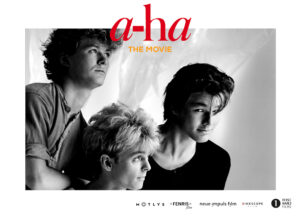
a-ha: the Movie (Thomas Robsahm, 2021) 3 out of 4 stars.
Norwegian musicians Morten Harket, Pål Waaktaar (now Waaktaar-Savoy) and Magne Furuholmen – born in 1959, 1961 and 1962, respectively – joined forces in 1982 as the pop band a-ha, and after three years of struggle released the chart-topping global hit “Take on Me,” the video for which proved as popular as the song. Though their fame and fortune have waxed and waned since then, they have, as of 2021, put out 10 studio albums, along with various other projects that they have worked on solo or with other folks. As with all groups of people collaborating closely for a long time, their relationships have also had ups and downs, yet they still, to this day, perform and tour together. Not only are they celebrated at home, but around the world. In a-ha: the Movie, director Thomas Robsahm (Modern Slavery) gives us a comprehensive documentary that should satisfy diehard and casual fans, alike.
Count me among the latter. As a teenager, I bought the band’s first album, enjoyed their James Bond theme song, and then soon forgot about them (sorry, guys!). And yet there is no question that their music remains firmly rooted in my memory, and every time I hear “Take on Me,” I turn it up; it always lifts my mood. I was fascinated to learn how that song was made, including the different versions (some released in Europe) that failed to win them acclaim. Music documentaries often reveal wonderful secrets about the behind-the-scenes songwriting, recording and mixing of well-known pieces, and this film does not disappoint. The famous chorus, for example, was expressly written to showcase lead singer Morten Harket’s wide vocal range, starting very low and ending very high. It does impress.
Nor does it shy away from exploring the complicated dynamics among the trio. Pål and Magne knew each other first, growing up as neighbors. They both played guitar, but the more forceful Pål convinced Magne to switch to keyboards. Each tells the story of their friendship from his own point of view, and though they may not agree on all details, within their collective version lies the true story for us to parse. Once Pål and Magne had formed a two-person group, they went in search of a singer, finding in Morten an equally ambitious and talented partner. Moving to London in 1983, after an earlier trip in 1981 with just Pål and Magne, they tried just about everything to find a producer and a studio, eventually landing with Warner Bros.
Pål was, at first, the main songwriter, though Magne points out that it’s his riff that we first hear in “Take on Me,” and they have had lingering, at times festering, resentments over who did what. Pål is by far the more dominant creative voice, though he has learned to modify his instincts to make room for the others. In one of his breaks from the group, he formed another band, Savoy, with his wife Lauren Savoy, whose last name he has added to his own, so he can’t be without humility and willingness to share credit (in fact, I wish the movie explored that side of him a little more).
Irrespective of their feelings for each other, the three men deliver extremely thoughtful meditations on celebrity, authenticity, art and life over the course of a-ha: the Movie’s engaging 109 minutes. Robsahm keeps the focus squarely on them, never showing anyone else’s interview but theirs, except in archival footage (of which there is plenty), preferring to bring in only voices of the additional witnesses. He also has fun using director Steve Barron’s animation aesthetics (from that “Take on Me” video) to take us in and out of the narrative. Overall, then, though the movie may have limited appeal to those who don’t care one iota about a-ha and their music, it will please just about everyone else.

